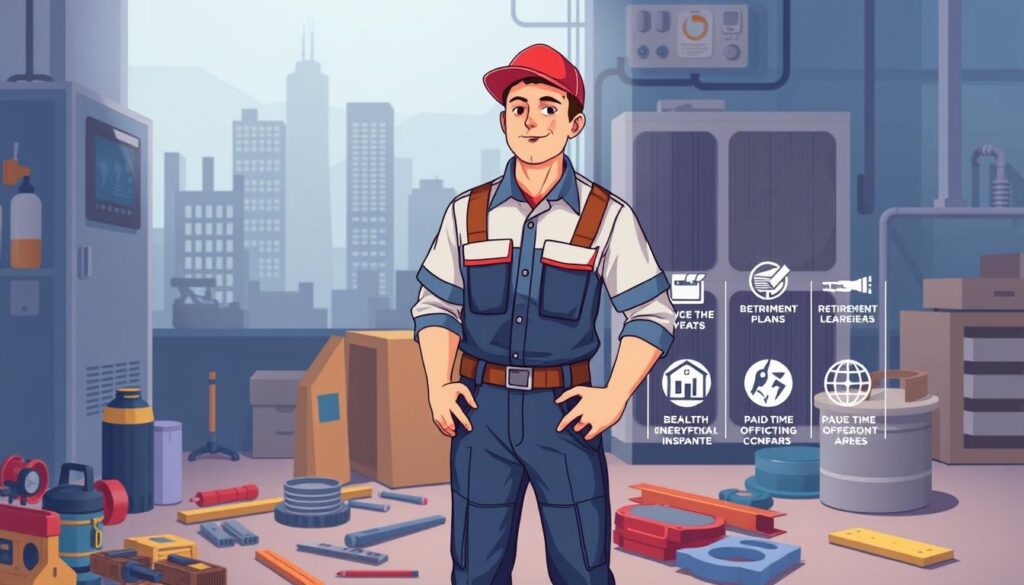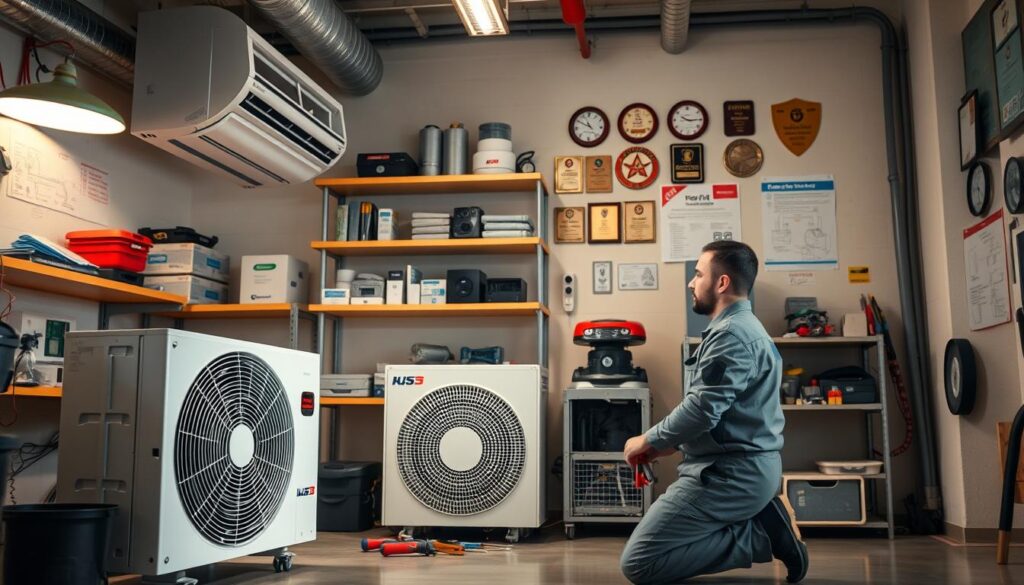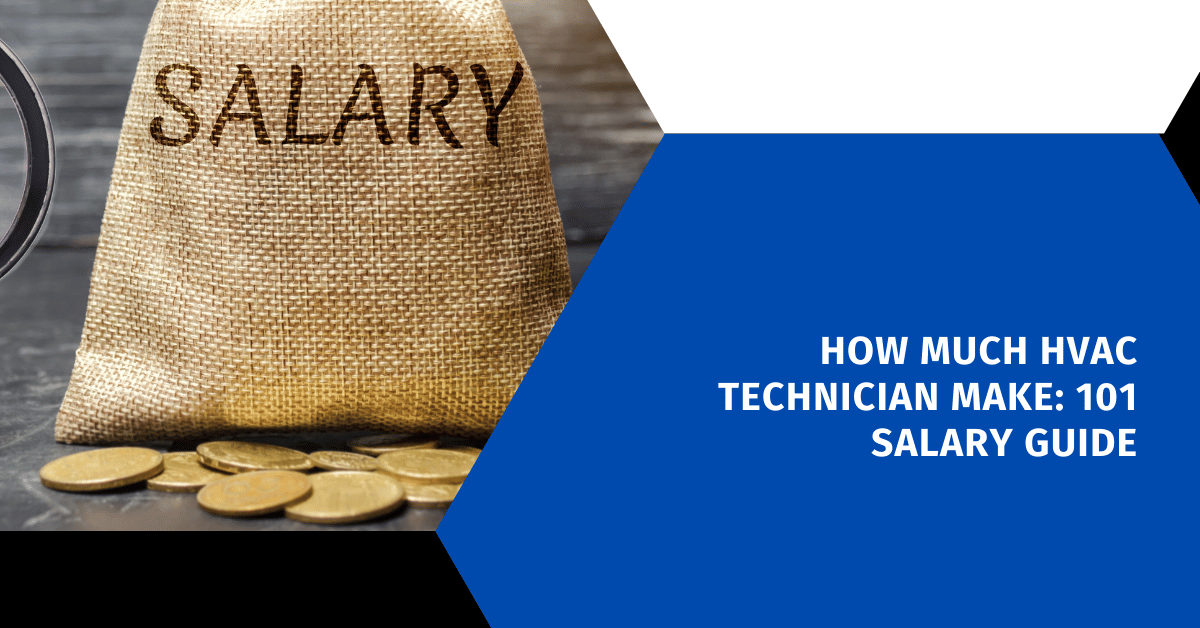Affiliate Disclosure
HVAC Guide Guys is a participant in the Amazon Services LLC Associates Program, an affiliate advertising program designed to provide a means for sites to earn advertising fees by advertising and linking to Amazon.
How Much HVAC Technician Make? Are you curious about how much HVAC technicians earn today? The field of heating, ventilation, and air conditioning is full of surprises. It offers great chances for those ready to enter this essential trade.

HVAC technician salaries might surprise you. With more demand in the U.S., skilled workers can earn a lot. They handle everything from home setups to big commercial systems, keeping our spaces comfy and working well.
If you’re thinking about a new career or growing in your current one, knowing HVAC technician salaries is key. It helps you plan your future in this exciting field.
Key Takeaways
- HVAC technicians have strong earning power in today’s job market
- Career chances exist in homes, businesses, and factories
- Pay depends on experience, where you work, and your specialty
- Knowing technical skills and getting certified can really increase your earnings
- There’s always a need for skilled technicians, so job security is good
Table of Contents
Understanding the HVAC Technician Role and Career Path
The HVAC industry is full of exciting career paths for those who love technical work and solving problems. HVAC technicians are key to keeping indoor spaces comfortable and safe. They work in homes, offices, and factories.
HVAC technicians install, fix, and keep heating, ventilation, and air conditioning systems running. Your salary in the HVAC field depends on your skills and how specialized you are.
Primary Responsibilities of HVAC Technicians
- Install complex heating and cooling systems
- Diagnose mechanical and electrical issues
- Perform routine maintenance and inspections
- Test system performance and efficiency
- Recommend system upgrades and replacements
Required Qualifications and Licensing
To be an HVAC technician, you need education and hands-on training. Most people finish a 2-5 year program or apprenticeship. Getting certified can really boost your salary.
- High school diploma or equivalent
- Technical training program
- EPA certification for refrigerant handling
- State-specific licensing requirements
Career Growth Opportunities
The HVAC field has many ways to move up in your career. You can start as a technician and work your way up to management or even start your own business. Keeping up with new skills is important for making more money.
With more experience, you can focus on areas like commercial HVAC, green technology, or advanced refrigeration. Each area can increase your earnings and job satisfaction.
Explore Our HVAC Shop
Looking for top-rated HVAC tools, parts, and accessories? Visit our shop and find the perfect solution for your needs.
Visit the ShopHow Much HVAC Technician Make: Average Salary Breakdown
Knowing how much HVAC technicians make is key for those thinking about this career. The pay varies based on several factors. But, national averages give a clear view of what you might earn.
The Bureau of Labor Statistics says HVAC technicians in the U.S. make between $48,630 and $77,920 a year. Newbies usually start at the lower end. But, those with more experience can make a lot more.
| Experience Level | Typical Annual Salary Range |
|---|---|
| Entry-Level | $32,000 – $45,000 |
| Mid-Career | $45,000 – $65,000 |
| Experienced | $65,000 – $85,000 |
| Senior/Specialized | $85,000 – $100,000+ |
Your earnings in HVAC depend on a few important things:
- Where you live
- Specialized certifications
- How much demand there is
- Your skills
“The HVAC industry offers competitive compensation for skilled professionals who continually invest in their expertise.” – Industry Expert
Remember, these numbers are just averages. Your actual pay can differ. Those in specialized areas like commercial refrigeration or industrial systems might earn more.
Factors Affecting HVAC Technician Salaries
Understanding what affects hvac technician income is key to planning your career. Your salary depends on many factors. These factors shape how much you can earn in different places and jobs.
Professional HVAC technicians earn different salaries for several reasons:
Geographic Location Dynamics
Your location greatly affects your salary. Places with extreme weather or big industries pay more.
- Southwestern states need more cooling, so they pay more for that.
- Northern areas require advanced heating skills, which are paid well.
- Urban areas usually pay more than rural areas.
Experience Level Impact
Your career growth is linked to your income. New technicians earn less, while experienced ones earn more.
- 0-2 years: Basic hourly rates
- 3-5 years: More technical skills
- 6-10 years: Specialized skills
- 10+ years: Expert-level pay
Industry Specialization Opportunities
Choosing a specific HVAC niche can boost your income. Specialized areas like commercial refrigeration or industrial HVAC systems often pay more.
- Residential HVAC: Standard market rates
- Commercial Systems: Higher technical complexity, better pay
- Industrial HVAC: Premium compensation for advanced skills
Explore Our HVAC Shop
Looking for top-rated HVAC tools, parts, and accessories? Visit our shop and find the perfect solution for your needs.
Visit the ShopTypes of HVAC Technicians and Their Earning
The HVAC industry has many career paths with different pay levels. Knowing the specializations can help you earn more.
HVAC technicians can choose from several specializations. Each has its own pay range:
- Residential HVAC Technicians
- Work mostly in homes
- Make about $45,000 – $65,000 a year
- Need good customer service skills
- Commercial HVAC Technicians
- Focus on big building systems
- Make $55,000 – $75,000 a year
- Require advanced technical skills
- Refrigeration Specialists
- Work with complex cooling systems
- Can earn $60,000 – $85,000
- More money with extra certifications
“Specialization is key to maximizing your earning in the HVAC industry.” – HVAC Career Experts
Your income can go up with more certifications and skills. Controls technicians, who manage complex systems, usually earn the most.
| Specialization | Average Annual Income | Key Skills Required |
|---|---|---|
| Residential Technician | $55,000 | Customer Service, Basic Repairs |
| Commercial Technician | $65,000 | Complex System Knowledge |
| Refrigeration Specialist | $75,000 | Advanced Technical Certifications |
| Controls Technician | $85,000 | Advanced Technology Skills |
By picking the right specialization and keeping your skills sharp, you can boost your earnings. This will lead to a fulfilling career in HVAC.
Regional Salary Variations Across the United States
Knowing how hvac technician salary changes by location can guide your career choices. The U.S. has varied chances for HVAC workers, with big differences in pay based on where you are.
Urban vs Rural Pay Differences
HVAC technician pay varies a lot between cities and rural areas. Cities usually pay more because of higher demand and living costs. Places like New York, Chicago, and Los Angeles offer better pay than smaller towns.
- Urban areas: Higher salaries, more job opportunities
- Rural regions: Lower pay, fewer specialized positions
- Average urban salary premium: 15-25% over rural rates
Top-Paying Cities for HVAC Technicians
Choosing cities with high demand can boost your earnings. Some cities are known for their great pay for HVAC workers.
- San Francisco, CA: Highest average salaries
- Washington, D.C.: Strong government and commercial market
- New York City, NY: Competitive compensation
Market Demand by Region
Where you are affects your hvac technician salary. Sunbelt states with hot weather and fast growth have lots of job openings.
The Southwest and Southeast are always looking for HVAC experts. This means steady pay for skilled technicians ready to move or work in busy places.
Explore Our HVAC Shop
Looking for top-rated HVAC tools, parts, and accessories? Visit our shop and find the perfect solution for your needs.
Visit the ShopBenefits and Additional Compensation

When looking at hvac technician wages, it’s important to see the whole picture. The total package for HVAC pros often includes many benefits. These benefits can greatly increase their earnings.
Typical benefits for HVAC technicians include:
- Comprehensive health insurance coverage
- Retirement plans like 401(k) with company matching
- Paid time off and vacation days
- Continuing education and training opportunities
Your hvac job pay can also grow with extra compensation. Many employers offer:
- Performance-based bonuses
- Overtime pay for emergency or extended work hours
- Profit-sharing programs
- Tool and equipment allowances
Specialized technicians with advanced certifications get better pay. They often get higher base wages, extra training funds, and more benefits. These reflect their advanced skills.
Some HVAC companies give special perks. These can include vehicle allowances, health savings accounts, and funding for professional growth. These extras can greatly increase your total compensation, beyond just the hourly or annual wage.
Career Advancement and Salary Growth Strategies
To move up in your HVAC career, you need a plan and to keep getting better. HVAC pros can make more money by focusing on their skills and making smart career choices. This is how you get the most out of your job.
There are many ways to climb the career ladder and earn more. It’s all about making smart moves and improving your skills.
Professional Certifications
Getting certified can really help HVAC techs stand out. Look into these important certifications:
- NATE (North American Technician Excellence) Certification
- EPA Section 608 Certification
- HVAC Excellence Professional Level Certification
- Specialized green technology certifications
Specialized Training Options
Getting more training can lead to better-paying jobs. Check out these training options:
- Advanced refrigeration systems
- Smart home technology integration
- Energy efficiency optimization
- Industrial HVAC systems
Industry Networking
Connecting with others in your field can really help your career. Here are some networking tips:
- Attending industry conferences
- Joining professional associations
- Participating in online HVAC forums
- Connecting with experienced mentors
| Certification | Potential Salary Increase | Average Cost |
|---|---|---|
| NATE Certification | 10-15% | $250-$500 |
| EPA Section 608 | 5-10% | $100-$300 |
| Advanced Specialization | 15-25% | $500-$2000 |
Being proactive in your career is key to success in HVAC. Keep learning and networking to open up new opportunities and increase your earnings.
Explore Our HVAC Shop
Looking for top-rated HVAC tools, parts, and accessories? Visit our shop and find the perfect solution for your needs.
Visit the ShopStarting Your HVAC Career: Entry-Level Prospects

Starting a career in HVAC is both exciting and rewarding. It’s perfect for those who love technical skills and hands-on work. At the entry-level, HVAC technicians can earn competitive wages that grow over time.
Entry-level HVAC jobs usually pay between $32,000 and $42,000 a year. Your starting salary depends on several things:
- Educational background
- Apprenticeship completion
- Local market demand
- Specific technical certifications
Apprenticeships are key to starting your HVAC career. These programs last 3-5 years and offer:
- Paid on-the-job training
- Classroom instruction
- Professional mentorship
- Pathway to journeyman certification
| Career Stage | Typical Annual Income | Key Opportunities |
|---|---|---|
| Entry-Level | $32,000 – $42,000 | Apprenticeship, Technical Training |
| Mid-Level | $45,000 – $65,000 | Specialized Certifications |
| Experienced | $65,000 – $85,000 | Advanced Specializations |
To boost your HVAC career, focus on continuous learning. Get specialized certifications and stay up-to-date with new technologies. This includes smart home systems and energy-efficient solutions.
Conclusion
The HVAC technician career is both exciting and rewarding. It offers a chance to grow your skills and earn well. HVAC technician salaries show a lot of room for growth, depending on your specialty and location.
Improving your skills through learning and getting certified can really boost your pay. The demand for HVAC workers is steady. This means you’ll find many chances to learn and earn more.
HVAC technicians are key in keeping spaces comfortable and energy-efficient. By staying up-to-date with new tech and adapting to changes, you’ll do well in this field. It’s a field that’s always evolving.
If you’re new to the field or want to move up, HVAC has a lot to offer. By focusing on your skills and exploring different areas, you can turn a starting job into a rewarding career.

